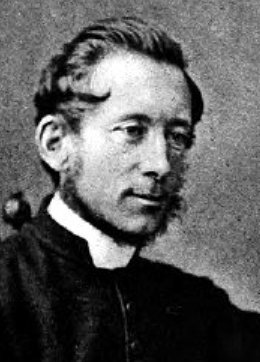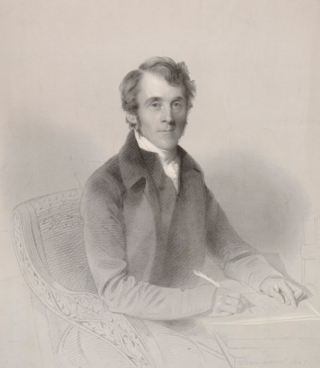Related Research Articles

Philip Schaff was a Swiss-born, German-educated Protestant theologian and ecclesiastical historian, who spent most of his adult life living and teaching in the United States.

John Charles Ryle was an English evangelical Anglican bishop. He was the first Anglican bishop of Liverpool.

Richard Watson (1781–1833) was a British Methodist theologian, a leading figure of Wesleyan Methodism in the early 19th century.

George Anthony Denison (1805–1896) was an English Anglican priest. He served as Archdeacon of Taunton from 1851.

Thomas Adams (1583–1652) was an English clergyman and reputed preacher. He was called "The Shakespeare of the Puritans" by Robert Southey; while he was a Calvinist in theology, he is not, however, accurately described as a Puritan. He was for a time at Willington, Bedfordshire, and his works may later have been read by John Bunyan.

John Bacchus Dykes was an English clergyman and hymnwriter.

George Cornelius Gorham (1787–1857) was a priest in the Church of England. His legal recourse to being denied a certain post, decided subsequently by a secular court, caused great controversy.
Thomas Pelham Dale (1821–1892) was an English Anglo-Catholic ritualist priest, most notable for being prosecuted and imprisoned for ritualist practices.

John Medley,, was a Church of England clergyman who became the first bishop of Fredericton in 1845. In 1879 he succeeded Ashton Oxenden as Metropolitan of Canada.

St Paul's Church, dedicated to the missionary and Apostle to the Gentiles Paul of Tarsus, is a Church of England parish church in Brighton, Sussex, England. It is located on West Street in the city centre, close to the seafront and the main shopping areas.

Richard William Enraght was an Irish-born Church of England priest of the late nineteenth century. He was influenced by the Oxford Movement and was included amongst the priests commonly called "Second Generation" Anglo-Catholics.
Archer Thompson Gurney (1820–1887) was a Church of England clergyman and hymnodist.

The Right Reverend Alfred Blomfield D.D. was an Anglican bishop in the last decades of the 19th century.

Eduard Herzog was a Swiss Catholic theologian and cleric who was a native of Schongau, Canton Lucerne. He was the first Christian Catholic bishop of Switzerland.

The former Holy Trinity Church, a closed Anglican church in the centre of Brighton, part of the English city of Brighton and Hove, now serves as an art gallery. Established in the early 19th century by Thomas Read Kemp, an important figure in Brighton's early political and religious life, it was originally an independent Nonconformist chapel but became an Anglican chapel of ease when Kemp returned to the Church of England. The church closed in 1984, but was converted into a museum and later an art gallery. Reflecting its architectural and historical importance, it has been listed at Grade II since 1981.
Frederick George Lee was a priest of the Church of England and a religious author. He co-founded the Order of Corporate Reunion.
William Gresley was an English divine. He was a high churchman, who joined in popularising the Tractarian movement of 1833.
William Cooke, widely known as Canon Cooke, was a Church of England clergyman, hymn-writer, and translator.
Henry Michell Wagner (1792–1870) was a Church of England clergyman who was Vicar of Brighton between 1824 and 1870. He was a descendant of Melchior Wagner, hatmaker to the Royal Family, and married into a wealthy Sussex family who had a longstanding ecclesiastical connection with Brighton. Wagner paid for and oversaw the building of five churches in the rapidly growing seaside resort, and "dominated religious life in the town" with his forceful personality and sometimes controversial views and actions. His son Arthur Wagner (1824–1902) continued the family's close association with Brighton.

Charles Edward Kennaway was a British Anglican clergyman, writer and poet.
References
- ↑ Murphy, G. Martin. "Purchas, John (1823–1872)". Oxford Dictionary of National Biography (online ed.). Oxford University Press. doi:10.1093/ref:odnb/22897.(Subscription or UK public library membership required.)
- ↑ "Purchas, John (PRCS840J)". A Cambridge Alumni Database. University of Cambridge.
- ↑ ecclesiasticallaw. "Hebbert v Purchas". ecclesiasticallaw. Retrieved 5 February 2022.
- ↑ ecclesiasticallaw. "Hebbert v Purchas". ecclesiasticallaw. Retrieved 6 February 2022.
 This article incorporates text from a publication in the public domain : Jackson, Samuel Macauley, ed. (1914). New Schaff–Herzog Encyclopedia of Religious Knowledge (third ed.). London and New York: Funk and Wagnalls.
This article incorporates text from a publication in the public domain : Jackson, Samuel Macauley, ed. (1914). New Schaff–Herzog Encyclopedia of Religious Knowledge (third ed.). London and New York: Funk and Wagnalls.{{cite encyclopedia}}: Missing or empty|title=(help)- New Schaff-Herzog Encyclopedia of Religious Knowledge, Vol. IX: Petri - Reuchlin (Purchas, John)